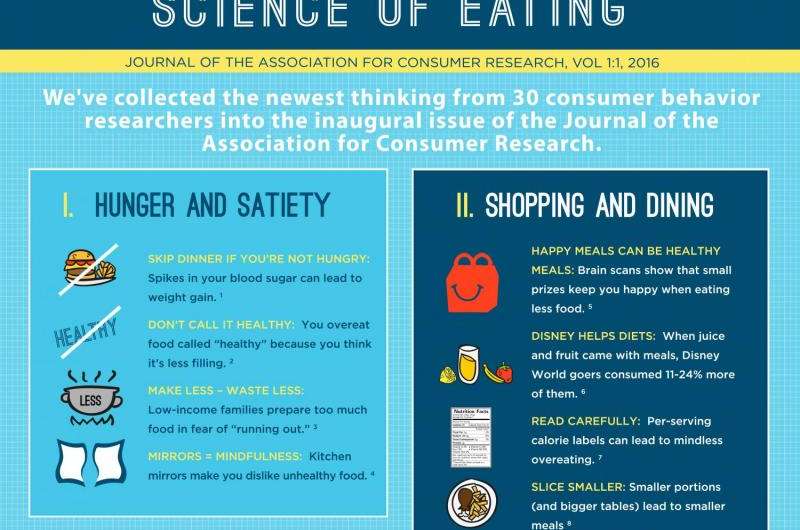Small plates can help us lose weight when we self-serve

There are small easy steps that we can take to tackle the burgeoning problem of obesity. One of those solutions is surprisingly simple: use smaller plates.
There have been over 50 studies examining whether or not smaller plates help in reducing consumption. Despite all these studies, there is surprisingly little consensus on the effect of smaller plates. Some find that smaller plates help reduce consumption, but others do not.
New research published in the Journal of the Association for Consumer Research examines all these prior research projects together and finds that overall, smaller plates can help reduce consumption under specific conditions.
The researchers collated 56 previous research studies examining the effect of smaller plates on consumption. The various studies examined whether smaller plates reduce consumption for a wide variety of conditions: food type (snackfoods, popcorn, ice-cream, breakfast cereal, rice, vegetables, fruit, etc.), plate-type (bowls vs. plates, serving platter vs plate from which the food is consumed), portion-size (fixed amount of food served, amount varied in line with the plate-size, or self-served portions), setting (consumers invited to a food laboratory vs unaware consumers in natural settings such as a buffet).
Combining all the studies showed that halving the plate size led to a 30% reduction in amount of food consumed on average. In the case of plates, reducing the diameter by 30% halves the area of the plate and reduces consumption by 30%.
The research found two important factors that amplify the effectiveness of small plates in reducing consumption. The first is that smaller plates reduce consumption best if diners are self-serving their portions. That is, if diners invited to serve themselves are provided with smaller plates, they serve themselves less, and by extension, eat less.
The second factor is that the smaller plates work best if consumers are unaware that their consumption is being monitored. That is, modifying the plate size appears to have no effect on consumption if people realize that they are being watched. This helps explain why so many studies conducted in food laboratories have not found an effect of plate-size on consumption.
The findings of this research show that simply switching to smaller plates can help curb overeating among individuals in situations where they serve themselves such as at the home dinner table or at a buffet. "Just changing to smaller plates at home can help reduce how much you serve yourself and how much you eat"," says joint-author Natalina Zlatevska of Bond University, Australia.
This article is published in the inaugural issue of the Journal of the Association for Consumer Research entitled "The Behavioral Science of Eating."
More information: Holden, Stephen S., Natalina Zlatevska, and Chris Dubelaar (2016). Whether smaller plates reduce consumption depends on who's serving and who's looking: a meta-analysis. The Journal of the Association for Consumer Research, 1.


















